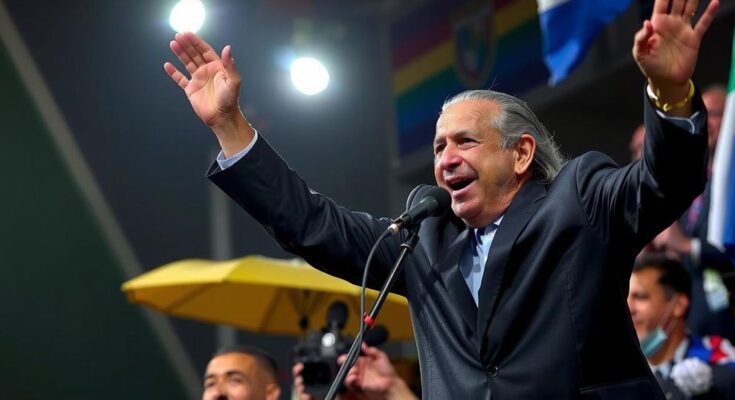Yamandú Orsi has won the presidency of Uruguay, defeating center-right candidate Alvaro Delgado, thus ending five years of conservative rule. Orsi’s pledge of unity and dialogue has resonated with voters amidst pressing issues like crime and economic recovery. His election marks a return to leftist governance known for progressive reforms. There are challenges ahead as he navigates a divided legislative landscape and pressing national issues.
Yamandú Orsi, representing the left-wing Frente Amplio (Broad Front) coalition, has been elected as Uruguay’s president, concluding five years of conservative governance. The official announcement of Orsi’s victory came following a tightly contested runoff election on November 24, 2024, where he garnered 49.8% of the votes, outpacing Alvaro Delgado of the center-right National Party, who received 45.9%. In Orsi’s victory address, he reaffirmed his commitment to bridging divides through dialogue, stating, “I will call again and again for dialogue to find the best solutions.”
The election of Orsi indicates a significant policy shift as the country seeks to return to leftist leadership. Under the previous Frente Amplio administration, which lasted from 2005 to 2020, Uruguay became notable for its progressive policies such as the legalization of marriage equality, abortion, and recreational cannabis. The results were met with jubilance in Montevideo, where supporters celebrated Orsi’s win, marking a rejuvenation of the leftist agenda in the region.
Orsi’s campaign attracted support from influential figures, notably former president José “Pepe” Mujica, a symbol of progressive ideals. As Orsi embarks on his presidency, he aims for stability and continuity, addressing pressing issues such as drug-related crime and economic recovery following the COVID-19 pandemic and a severe drought. However, challenges remain, particularly with rising crime rates associated with drug trafficking and economic recovery that, although progressing, is still sluggish.
In the preceding legislative elections, the Frente Amplio secured a Senate majority yet holds a minority status in the Chamber of Representatives, indicating future hurdles in implementing significant reforms. Orsi’s victory has resonated across Latin America, with leaders such as Brazil’s Luiz Inácio Lula da Silva celebrating this electoral success as a shared triumph for the region.
Notably, despite his ongoing battle with illness, former President Mujica cast his vote, reflecting on the importance of consciousness towards the future of the younger generation. The transition of power is anticipated to occur seamlessly, with Orsi set to be inaugurated on March 1, 2025.
Yamandú Orsi’s election marks a turning point for Uruguay after a five-year span of conservative rulership characterized by an economic and social environment ripe for change. Uruguay has a historic reputation for democratic stability and progressive reforms. Notably, under the previous leadership of the Frente Amplio coalition, transformative social policies were enacted, making the country a forefront in the global movement for human rights and social equity. The context of this election reflects a desire among the electorate to reinstate these values while tackling contemporary national issues.
The election of Yamandú Orsi embodies a significant return to left-wing values in Uruguay, indicating a clear voter preference for progressive governance. As he prepares to take office, Orsi must address significant challenges, including rising crime and economic recovery impeded by previous global crises. The anticipation surrounding Orsi’s administration underscores the electorate’s enthusiasm for stability, social equity, and continued dialogue among political factions while overcoming contemporary concerns.
Original Source: dailypost.ng




